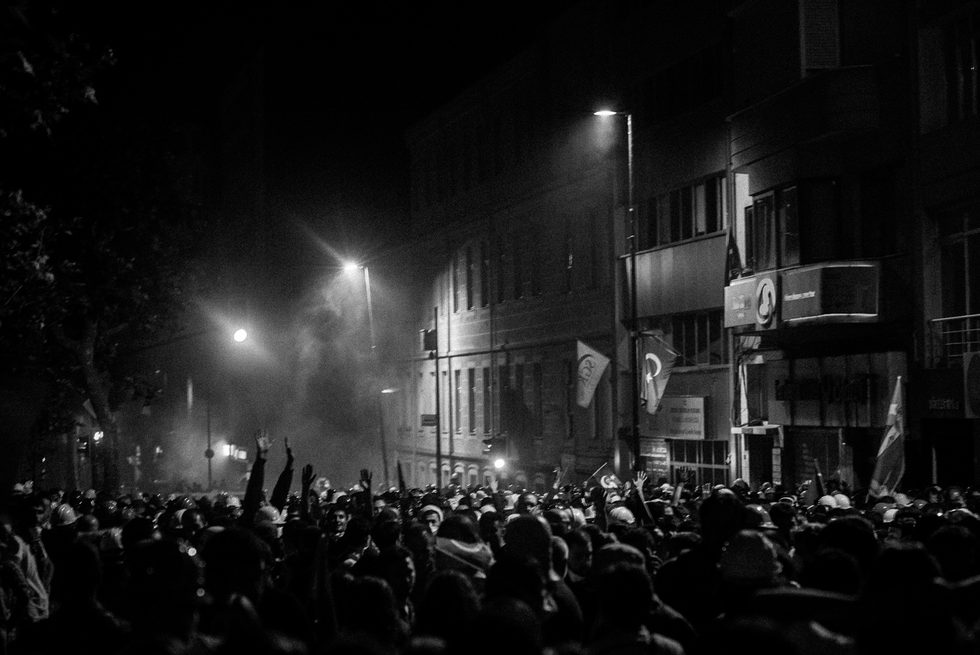On the Fantasy of Dispossession
From the Series: An Impromptu Uprising: Ethnographic Reflections on the Gezi Park Protests in Turkey
From the Series: An Impromptu Uprising: Ethnographic Reflections on the Gezi Park Protests in Turkey

From the balcony of a building overlooking Istiklal Street, Ali was joyfully waving to the massive crowd of people marching underneath and chanting slogans in Turkish, Kurdish, Arabic and Armenian: “Don’t be silent, shout out loud, there are homosexuals,” “Homophobic state,” “Sexist Erdoğan,” “If oppression and violence are moral, we are immoral,” “the minister of family, whose family is she a minister of?” “The rights of LGBT are the rights of my child.” It was the Pride March of 2013 and forty-thousand people, an unprecedented number of protesters, turned this day into an historical event in the long fight against homophobia and sexism. (One only has to be reminded that in 2003 only thirty people came to support the first Pride held in Istanbul.) It was during this march that the echoes of Gezi were becoming sound, as in the slogans “Yesterday we were at Gezi, today we are here,” and “We exist too.”
“This has never happened before; what is happening here is amazing.” Ali said this to me a little later when we met in the street. The march, which would ultimately last three hours, was still going. The next time I saw him was in the hospital. Gezi park was already in the hands of the police, the fora in other parks were now the loci of renewed political resonance, ideas, and actions, and clashes with the police had now become part of the everyday routine for all of us who lived or lingered in the surroundings of Beyoğlu. As for Ali, his health was seriously deteriorating. Indeed, the Gezi resistance coincided with Ali’s resistance, and the LGBT community persistently participated in both, as Yasemin Öz has recently mentioned.
“I spent a month in a small room on the third floor with limited air, sleeping, feeling suffocated, but I did not lose my mind. My friends did their best to make the room look like my room at home and to find distractions to help me pass time,” Ali writes on September 4, 2013. He was going through one more chemotherapy treatment in a series of attempts to fight against the cancerous cells that had been found in his body a year before. Ali had been diagnosed with cancer after his breast removal operation—an operation that had made him visit a gynaecologist for the first time in his life at the age of thirty-nine. Why? Because, as Ali explained in his blog, the fear of facing transphobia made him avoid getting a check-up. But as a founding member of the Voltrans Transmen Initiative, and with long experience in the LGBT and feminist movements, Ali knew how to give certain fights in life. Ali had a blog where he was writing about his bodily transformations, his coming out to his father, life in the hospital as a trans man, the importance of having friends, or “family conditioned by love and not by blood,” as he would emphasise. The troubling concept of survival as a political praxis reverberated in each of his posts.
On the night of September 25, 2013, we lost a comrade, a friend, and his beautiful energy and smile. But hope did not die with Ali’s death. The funeral, which took place soon after, was crowded with people who made sure that “Ali” would not die in his death and that the funeral procedure would be done according to his self-defined gender identity (and not the one assigned him by birth). On the gravestone, his name remained Ali Arıkan, and the pink card initially attached to the coffin was changed to blue. His “family” washed his body and carried him all the way to the soil. Indeed, his family—the LGBT community—persistently tried to make sure his death would not change what he fought for in life.
If anything, the Gezi resistance made it possible to get many voices attuned to the passionate attachment of claiming “to be present- to exist” (as in the slogans chanted in the streets). It made it possible to claim political presence through the mobilisation of collective action against the continuous use of governmental technologies of violence. It made it possible to claim back the experience of being exposed to mourning.
In the echoes of Gezi, Ali’s death gives life to the question of what it means to live and die otherwise. How, indeed, can one make his passionate attachment to a different vision of life survive the management of violent annihilation, neoliberal governmentality, and modern biopolitics, or for that matter, thanatopolitics, especially if one’s life has been rendered invisible, prohibited and sanctioned? In the echoes of Ali’s life, Gezi reminds us of the effort made and the sacrifice entailed in troubling current neoliberal, nationalist, sexist, homophobic, and transphobic regimes that sustain and reproduce uncertainty, fear, social deprivation, and violent dispossession In reality, it is not death that renders us dispossessed, but the inability to voice a persistent claim against the conditions that kill (something in) life. And that reality has not yet died, as in a fantasy that persists.
Voltrans Belgeseli (Teaser) from crazy for rainbow on Vimeo.